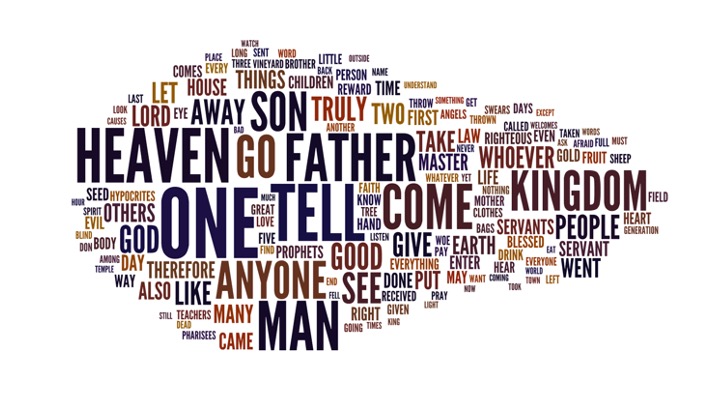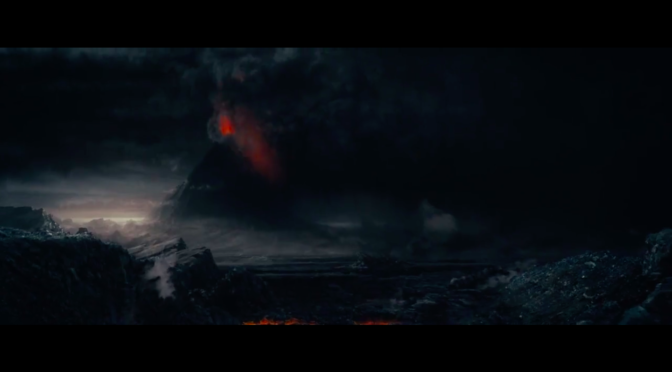This is an edited transcript of a sermon on Matthew’s Gospel from City South Presbyterian Church in 2022. You can listen to the sermon here, or watch it on video here. The running time for those options is 35 minutes.
Well, this morning, we’re kicking off a journey through Matthew’s Gospel. It’s a series where we’re going to zero in on the message of Jesus. The bits that sometimes come up in red letters in your Bible.
This isn’t because the red letters are somehow more important than the life of Jesus—his actions—or even the narrative that provides the context. In fact, the last time we did Matthew together as a church, we covered the ‘big story’ of the Gospel…
But it’s because we do want to understand the message of Jesus—what he came to tell us, and what he came to call us to do—because that’s part of our Great Commission—part of what we’re sent into the world to do as we seek to be and make disciples (Matthew 28:18-20). These last recorded words of Jesus in Matthew—that tell us to make disciples, baptizing them in the name of the father, son, and Holy Spirit and teaching them to obey the commands of Jesus.
To be a disciple is not just to believe that Jesus is “God with us” and the resurrected king who brings forgiveness of sins, but to obey the commands of Jesus. To listen to him—this is what faith looks like. So if you had to sum up the message of Jesus—in Matthew, or in any of the Gospels—I wonder what you’d say? What do you think Jesus commanded most?
What is the essence of these words of God’s word in the flesh—God with us—that give life?
Maybe it’s a call to repent?
Maybe it’s a command to love?
How would you sum up the message of the Gospel? What Jesus came to tell us? Here’s a fun thing… Back when ‘wordle’ was a tool to make a word cloud from a bunch of text rather than an addictive word puzzle game, I made this wordle of the red letter parts of Matthew’s Gospel… The size of the word indicates how frequently it’s used.

You might’ve guessed “love” was at the heart of the message of Jesus?
It’s there just between one and tell. You might have guessed ‘forgiveness’ or ‘sin’ were at the heart of Jesus’s message—and they’re important—but they aren’t marked as important by their frequency in his speech. This sort of word cloud thing doesn’t weigh words based on when they’re said, just how often.
But it is probably worth us paying attention to the fact that Jesus talks about “the kingdom of heaven” and “the kingdom of God” more than anything else in Matthew’s Gospel. It’s a topic he speaks about 50 times in the Gospel.
And here in the passage we’ve just read, as Jesus begins to preach, it’s his priority — both in chronology and in Matthew’s summary of his preaching, as he calls people to repent — to turn from their prior way of life towards him — because the kingdom of heaven has come near (Matthew 4:17).
We are dipping into Matthew’s Gospel in chapter 4 as Jesus launches his preaching about the kingdom… and it’s probably worth quickly catching up on the context for these words.
Matthew opens with a genealogy, a family tree, showing us how the story of Jesus connects to the story of Israel — God’s nation — his kingdom. Jesus is positioned as the Messiah — which means the anointed king — who is the son of David and the son of Abraham (Matthew 1:1). And Matthew gives us three key points in Israel’s story to help us understand Jesus; Abraham—who is the father of Israel, the man God promised would be the father of his nation, the nation he would use to restore blessing to the world, and the reign of David — the king whose family tree God promised would produce a king who would rule God’s kingdom forever, and the exile to Babylon — that moment when God’s nation, Israel, was taken into captivity in exile— cut off from God’s blessing and his presence— so that they’re wondering what God’s kingdom even looks like now, and where this king would come from (Matthew 1:17).
After the genealogy, Matthew describes John the Baptist turning up as a prophet; a voice from the wilderness — preaching the same message Jesus is about to preach; a message that exile is about to end because the kingdom of heaven is about to turn up (Matthew 3:1-2).
In a little picture of this happening, we had Jesus turn up to the Jordan — the river that Israel crossed as they became God’s chosen nation (a kingdom) in the exodus, so that he might be baptised by John (Matthew 3:13).
Jesus is re-enacting Israel’s story here.
The first words Jesus speaks are at his baptism. He says he wants to be baptised in order to “fulfill all righteousness,” he’s showing what the real Israel, the real people of God — his real kingdom — will look like in contrast to those who’ve come before (Matthew 3:15).
He goes down into the water and comes up, and there’s this scene when the heavens open, God’s spirit descends onto Jesus (Matthew 3:16). And a voice from heaven declares this is God’s Beloved son (Matthew 3:17). There are echoes here of what God says of Israel back in the Exodus story. As Israel is being called out of Egypt, God calls his people his son (Exodus 4:22).
We’re just going to take a quick dive into some Old Testament background here to see how exactly Jesus is fulfilling all righteousness both in his baptism, and in what comes next. Later in Exodus, Israel is called his treasured possession in all the earth—his kingdom of priests (Exodus 19:4).
The exodus is God’s creation of a people — people called through the waters of the Jordan to become his kingdom of priests; called out of Egypt; out of the nations; out of the kingdoms of this world… to be his holy nation.
In Deuteronomy, this role comes with a responsibility—to worship God only, to not worship idols, the gods of the nations or created things (Deuteronomy 4:19), because they’ve come out of the smelting furnace — the sort of process you’d use in the ancient world for metalwork or to make an idol statue — they’re an image of God, is living ‘smelted’ idol statues. They’ve come out of Egypt, and they’ll go through the waters of the Jordan and become his people, his kingdom; his image-bearing nation (Deuteronomy 4:20).
But, if they disobey, if they don’t listen to God but are tempted to worship like the nations, God’s going to scatter them among the nations. That’s the exile we see in the genealogy—it’ll be like they’re back in Egypt. They won’t be God’s special people anymore; his kingdom (Deuteronomy 4:27).
They won’t be his blessed people who bring blessing. The prophet Jeremiah picks up this language from Exodus and Deuteronomy to say that instead of being blessed, those of God’s people who disobey the commands that come with God’s covenant—those who don’t obey him and do everything he commands—those people will be cursed instead of blessed (Jeremiah 11:3-5).
And Jeremiah says Judah, the southern kingdom, like Israel, the northern kingdom before them — is going to experience this curse. They’ve been warned over and over again.
But they didn’t listen to God.
They did not pay attention.
They did not obey.
They followed their evil hearts, and so now God is bringing the curses of the covenant on them (Jeremiah 11:7-8).
Exile.
Being scattered amongst the nations.
The people haven’t listened. Israel and Judah have both broken the covenant (Jeremiah 11:10-11). They failed to listen to God. They did not live as God’s kingdom of priests—his image bearers—and this is the background when Jesus arrives. This is why when John the Baptist says the kingdom is near, and then baptizes Jesus, and then the heavens open and God says “this is my son whom I love” this is why this is so important. The exile is drawing to an end.
God’s kingdom is about to be launched again with the arrival of God’s righteous king who listens to God. And we see this in the passage we read together this morning. Jesus as the son who listens to his father. Jesus as the true Israel. The one who shows us what God’s kingdom looks like. The image of God. Cause then we get another little exodus re-enactment. Israel wandered in the wilderness for 40 years, here Jesus goes out into the wilderness for 40 days and 40 nights (Matthew 4:2).
This isn’t the only “40” symbolism in the Old Testament. In the Noah story, the rain comes for forty days and forty nights.
It’s an interesting rabbit hole that we won’t go down to see both the Noah story and Israel’s entry into the promised land as ‘new eden’ moments—moments of re-creation where we’re getting a chance for a new humanity that might replace a broken pattern of humanity where people have stopped listening to God. A humanity broken because it listens to the temptation of the devil and so gets exiled from God’s presence, being replaced by a humanity re-created through passing through waters… A bit like baptism…
There are rich Old Testament themes we’re being called to hear in the setting of this back and forth between Jesus and the devil. They actually go all the way back to the beginning… To what humans were made for… See these ideas of kingdom and sonship actually begin back in Genesis 1—where humans are made as God’s image bearers—there’s a bunch to this idea, and one of the concepts caught up with being an image bearer is being a child—a chip off the old block—and another is this task of representing and ruling. This idea of filling the earth and subduing it—being fruitful and multiplying God’s image is the idea of kingdom (Genesis 1:28).
This has often been called the cultural mandate—this instruction to make culture and pursue fruitfulness—but it’s also a kingdom commission; A call to spreading the kingdom over the face of the earth as you spread the rule of God and the presence of God over the face of the earth…
This idea of God’s kingdom was the very heart of God’s project for humanity—being God’s people, exercising God’s rule over creation with him. That required being in a relationship with him as his image-bearing children… And it required God’s blessing. So with that background, we’re asking if Jesus is going to repeat the mistakes of the past—Israel, who were meant to bring God’s blessing but turned to idols, Noah, who fell to disobedience almost as soon as he got off the boat and was told to be fruitful and multiply, and Adam and Eve, who were created to do the same and placed in Eden but didn’t listen to God and so were able to be tempted into sin by Satan, who showed that Adam and Eve hadn’t really listened to God… When he asked “Did God really say” (Genesis 3:1).
Adam and Eve didn’t respond with God’s actual words. They failed. They sinned… And that led to curse instead of the blessing and fruitfulness and flourishing partnership with God with his provision of all those fruit trees back in Genesis 1 (Genesis 3:17). And to being banished from the land God had given them to rule and expand (Genesis 3:23), just like Israel in the promised land later. So we’re asking: will Jesus do better?
Better than Israel? Better than Noah? Better than Adam and Eve?
Will he listen to God and show what it is to worship him? And the three back and forths are meant to show us exactly that…
His words—these red-letter words—are all straight from the pages of the Bible. Straight from Deuteronomy, in fact… So when Satan—the tempter—turns up and says “don’t trust God to feed you when you’re hungry here, take matter into your own hands… Take God’s place yourself” (Matthew 4:3), Jesus says “”It is written: ‘Man shall not live on bread alone, but on every word that comes from the mouth of God.'”” (Matthew 4:4).
He’s modeling living on the word that comes from God because these words come straight from Deuteronomy 8:3—referring back to God providing bread in the wilderness—for his people, and that was meant to teach them—to rely on God’s word for life. And then the devil takes him to the roof of the temple—the pinnacle of this building that was on the top of a mountain—a building that represents heaven meeting earth—and Jesus and the devil are on the highest point… The point closest to heaven… And he says “throw yourself down from the heavens… God will catch you…” (Matthew 4:5-6). And again, Jesus replies: “It is also written: ‘Do not put the Lord your God to the test'” (Matthew 4:7), which comes straight out of Deuteronomy 6, another passage that tells the story of God saving Israel from Egypt that comes right after a command to “fear the Lord your God and serve him only.” And so again Satan takes him up to this high point—a place where all the kingdoms of the world could be seen—there aren’t many places on earth physically where this could be. This is again a blurring of the boundaries between heaven and earth—Satan is offering him the key to all these earthly kingdoms—which of course, are going to be Jesus’ anyway, much like ‘being like God’ was what Adam and Eve were created to be.
He says “you can have these without the cross—without the costly obedience—if you bow down and worship me instead”—if you re-order the heavenly courts and the earthly kingdoms this way (Matthew 4:8-9). And Jesus says “Away from me, Satan, for it is written” (Matthew 4:10). And again he quotes Deuteronomy, from earlier in chapter 6. Over and over again… “it is written” (Matthew 4:4, 7, 10). This is the mantra of a faithful son of God—one who listens to God and so speaks the word of God as the language of his heart.
The one who listens to God and so knows God so well that he knows the father, who he loves, is not holding back his goodness. That he isn’t a miser. That the grass isn’t greener on Satan’s side. That idols don’t deliver they just deceive and pull us from God.
This is a king—a son of God—an Israelite—an image-bearing ruler—who shows us what it is like to reflect God’s nature and rule in the world in partnership with God, as he models worshipping God. Jesus even goes and picks a new town to live in to model this obedience and knowledge to the word of God. To fulfill what is written in the prophets (Matthew 4:13-14). And then he starts preaching the message of the Gospel. Repent. God’s kingdom has arrived (Matthew 4:17).
Because God’s king has arrived.
To lead us out of exile from God, away from the clutches of Satan, and the idolatrous empires that destroy us… and into a new exodus, into a new promised land—the kingdom of heaven. So what do we do with these words of Jesus—both the example we see in his red-letter words in his interaction with Satan—and his command to us as he begins preaching…
These words that give life — repent.
Repent. For the kingdom of heaven is near.
Now we often think of repentance as turning around— turning away from the wrong way we were living —and it certainly involves that — but here we’re invited not just to turn away from the lies of the tempter that we might listen to and live — words that bring death. We’re not just invited to turn away, but to turn to the kingdom. To turn to and receive a king who will lead us out of exile, and into a new exodus — a new way to life. Life as God’s people — his kingdom — again. Jesus is inviting us to recreation; to head towards Eden again, and life with God. Repentance is going to mean being able to say no to the tempter— something Israel couldn’t do, even with God’s word in their scriptures. Something that Adam and Eve couldn’t do — even with God’s words ringing in their ears.
Repentance is going to mean being able to answer those who want to twist God’s word to lead us away from God; those promising to give us what we want — what our sinful hearts want — by making us believe God is for something that he is actually against, or that God is holding back something that he should be giving us. This is what temptation looks like. A twisting or rejecting or spinning of God’s word.
This is what leads to sin—to disobedience—but this isn’t just about believing the wrong thing. Believing that God says something he doesn’t, or doesn’t say something he does.
Ultimately this is about loving the wrong stuff. Temptation works by tapping into our desires—desires that are so often sinful because they come from sinful hearts that are broken by the curse; sinful hearts that want to replace the living God and the life he gives with all sorts of things — idols — that are dead and lead to death.
This is the dynamic at play any time you want to put yourself in charge of your life — or that you want the Bible to say something it doesn’t in order to justify the longings of your heart — or you just don’t even care what God says, or the Bible says, because it’s at odds with what you believe to be good and you don’t want to embrace costly obedience.
And when we don’t listen to God — just like with Israel and with Adam and Eve — it leads to curse — the curse that comes with sin is death; and exile from God’s presence.
But God has sent Jesus to lead us back into his presence as his kingdom of priests; his image-bearing people who are called to be fruitful and multiply as we make disciples.
Have you repented? Turned to Jesus as king, and this new way of life?
If you have, you are united to God’s son — you’re a child of God. How will you take up the example of Jesus — God’s king — his faithful son?
What are you doing to so soak yourself in God’s word that you know God’s word — so that you know God and his goodness and love — in order to say no to the schemes of the tempter, who wants to pull you to worship anything but God?
You aren’t going to know it unless you read it — or listen to it — or sing it — or talk about it — and you’re not going to have it come to the tip of your tongue in these moments unless you’re both marinating in it and delighting in it — not just reading out of some sense of obedience to some sort of religious rule about quiet times, but reading it because you want to know what God says because you love him and you know he loves you.
What is it that leads Israel astray? That leads Adam and Eve astray? What is it that Satan tries to use to pull Jesus away?
Their hearts. Hearts that want to love and worship anything other than God. Desires for something they think God is holding back from them because they can’t see the big picture.
What is it that pulls us away from God?
Our hearts.
We keep loving stuff God says is forbidden — in his word — we keep using our own words to self-justify and listening to people who say “did God really say”.
And this leads to disaster—and the solution in those moments is knowing what God actually says. And not just knowing — cause Satan quotes God too — but obeying in relationship — as God’s people who love him.
So repent. Turn to God and listen to his word. Hear this command of Jesus to repent. Turn to God and worship him. Stop worshipping other gods, stop being led to death by your evil heart and by Satan, and be led to life by the words that give life —the words of Jesus. Because not only has the kingdom of God come near in Jesus — it has now come.
The one who speaks the word of God because he is the son of God — because he is God with us — the one who speaks the words that give life — the one who is the word who gives life, gives his life as the ultimate demonstration of obedience to God, to “fulfill all righteousness.” The one who says “not my will but yours be done” trusting that his father will raise him from the dead. And in doing this — as he is crowned and raised up before a world that gives in to the temptation of the evil one — God’s kingdom does come. God’s king is enthroned — first on the cross, and then as he ascends in glory.
Exile from God is over for children of Abraham and children of Adam who put their trust in Jesus and are united to him as part of God’s kingdom in this exodus. This is what Jesus means when he says in the Great Commission that all authority has been given to him.
We’re invited to join God’s kingdom — to become and make his disciples — if we put our faith in Jesus —God’s son — as our king; if we’re united to him so that we share in his death and resurrection — so that we receive his spirit, so that God with us is with us as we pass through the waters of baptism — our own Jordan — our own exodus — our return from exile — beginning a new life in his kingdom, listening to and obeying his word as people of the new covenant brought through his blood. We are no longer exiled from God, but God is with us always, leading us to life with him in the promised kingdom of heaven.



